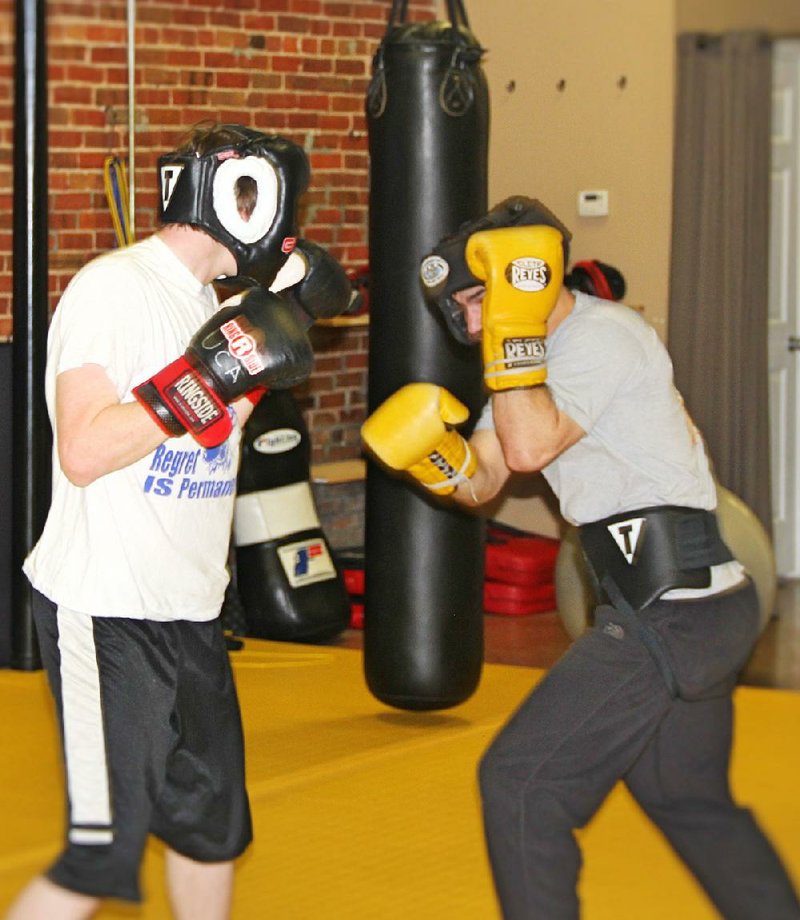CONWAY -- The dozen or so young men started the evening with 35 jumping jacks, did burpees and jumped rope along the way, and ended with helmets, boxing gloves and a pep talk.
It was Wednesday night at the Gravitas Martial Arts center in downtown Conway, where anywhere from five to 15 teenage boys on probation have been gathering almost every week.
There, they turn their anger and boredom to a sport they enjoy. They also learn to follow the rules.
A 16-year-old boy was among the first to arrive on a recent night. He was wearing a T-shirt with a boxing glove in the middle and the words "Temptation Is Temporary. Regret Is Permanent." He was ready to work out and, as he put it, channel his anger.
The boxing program, started in 2009, is for boys ages 13-18 who are on juvenile-court probation.
"Boxing is just a front," said their coach, Neil Rutman, who also coaches the University of Central Arkansas' boxing team and heads UCA's piano division.
"The purpose of them being there with me and the college guys is to let them know that they are really important and somebody cares the world about them, and finally that -- no matter what they think -- they cannot break the law. End of story."
The boxing matches are not in a traditional gym but take place in donated space at the martial arts building on Front Street.
Judge Troy Braswell, who presides over juvenile-court cases in the 20th Judicial Circuit, which includes Faulkner County, said the boxing program is one of several efforts to help moderate- to high-risk young people stay out of trouble rather than repeatedly getting into it. Among other programs are basketball for boys and a book club for girls.
Braswell said a car-repair class is planned -- perhaps one for boys and one for girls -- where youngsters could learn basics, such as changing a flat tire or changing the oil.
Boys and girls don't usually attend the juvenile-court-related classes together. At one time, three or four girls participated in the boxing class, but no longer.
"They were really a distraction for the young men," Rutman said.
Rutman compared boxing to "a chess game that goes 5,000 miles per hour."
"So, they [the boys] have to know strategy and think. It's also a nonviolent sport," he said. "The fundamental [element] is sportsmanship. You're never angry when you're sparring or boxing. You're just trying to dominate your opponent. ... It's a rough sport but not a violent one" -- unlike a situation where someone wants to hurt another person out of anger.
A 17-year-old boxer on probation for theft of property said the program has shown him "that I don't need to put my hands on someone to solve a problem." Instead, he's learned "to talk it out."
The boy is perhaps the smallest but most talented boxer in the group.
His mother watches with pride.
"He's learning to control his anger," she said. "He interacts with people better. He enjoys it."
Near her sat another mother, who said her 16-year-old son's "outlook ... is a lot more positive" when he's at the boxing events.
Also, her son's grades have greatly improved since he joined the group, she said.
Rutman sees that boys who raise their grades are rewarded.
If a boy raises his average by 10 points in one class in a semester, he gets a T-shirt and is taken to a sporting event. If the boy does that in two classes, he gets those same rewards plus a newspaper article about his success in the local newspaper, The Log Cabin Democrat, Rutman said.
Braswell decides which boys to assign the boxing classes but doesn't force them to go. If a boy doesn't think he'd like boxing, the judge said he will try to find another program for him.
Braswell also doesn't send teenagers to jail if they fail to show up for some of the classes, but such information is included in reports to him.
That information helps Braswell make decisions such as "how do we handle this kid going forward," especially if he knows why they did not participate.
Even so, Braswell said, he couldn't recall a kid who, once he was involved in the boxing program, didn't want to attend.
Rutman said the program is such a hit with the boys that two or three of their friends who have never been on probation also attend.
Braswell said the program also teaches the boys that they can benefit by "listening to somebody give constructive criticism" and by helping them learn "how to critique their partners" effectively.
"The hope is that they can take the skills they are learning and apply those in other areas of life," Braswell said.
The judge said Rutman "shows up in court in support of some of the boys just so they know they've got somebody in their corner. ... A lot of these young guys feel like they don't have anybody in their corner."
But when it comes to Rutman, "He never waivers," Braswell said.
State Desk on 03/19/2017
